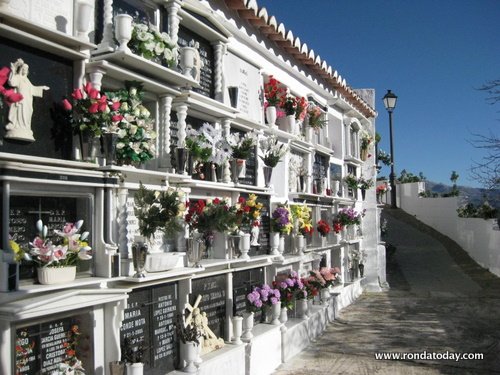EU citizens, in particular British, make up a substantial number of property owners along the coastal areas of Spain, and in the Serranía de Ronda there are officially 4,200 expatriate residents, though estimates suggest as many as three times that number are only resident for some months of the year, or have never registered with their town halls, yet own property.
The need for knowledge about wills and inheritance issues is therefore high, but not easily available. Ronda Today always advices seeking professional legal advice, however the following information should act as a starting point.
Owning property is for more people a significant investment, and in the event of death, can become a nightmare for beneficiaries to manage, even more so if your next of kin don’t regularly visit Spain and speak the language. You may have a will in your home nation, and it can be utilised in Spain, but in practical terms it could take months or even years before your last wishes are carried out.
By contrast, arranging with a local English speaking lawyer (abogado) to prepare and execute a Spanish will is in most cases affordable, and generally doesn’t cause problems settling estates like a foreign will can. In Ronda there are several lawyers who can help with experience of dealing with foreign resident property.
Of course, having a Spanish will doesn’t negate the need for wills in other jurisdictions, in fact you should probably have a will in each country where you have property, and stipulate in the will that another will also exists, though unless your property holdings are particularly complex there really isn’t any need for this either.
Once your Spanish will has been drafted you’ll need to sign it in the presence of a notary. Your will must be written in Spanish, though it can be prepared in both languages to make it easy for non-Spanish speakers to understand its contents. If the maker of the will (testator) doesn’t speak Spanish, then an officially recognised translator must be present when the will is signed, after which the notary will send a copy to the central wills registry in Madrid.
Spanish wills don’t require the naming of executors, thus it isn’t necessary to appoint an executor, but you can if you wish name one or several ‘Albaceas’, think of them as trustees is you like, whose permission must be sought before property mentioned in the will can be disposed of. Interestingly, unlike executors or trustees, an Albacea does not legally own the property, and in most instances the partners of your law firm will be entrusted with this role.
Be particularly careful that your Spanish will doesn’t accidentally supercede your home country will, this is easily done since usually the latest will signed is accepted throughout Europe as your most current, so it is important to select a lawyer with experience of preparing wills for foreigners. Ensure that a properly worded jurisdiction clause is included in all of your current wills to avoid this eventuality.
Inheritance Taxes
Inheritance tax is very confusing, and seems to defy normal explanation, and can change from time to time, so please understand that consulting a lawyer should be mandatory if you plan to structure you will so that beneficiaries pay the minimum amount of tax after your death.
The first point to note is that inheritance tax is not charged to your estate, it is actually payable by your beneficiaries, so the amount that each person pays is not fixed, it depends on their circumstances, whether they are a resident in Spain, and their relationship to the deceased. What this means is that each beneficiary will be eligible for tax free allowances and thresholds at different rates, so whilst your will may seem fairly straightforward to you, be aware that after your passing, your loved ones may inherit a tax nightmare.
Furthermore, inheritance tax is charged on a sliding scale starting from 7.65% (for the first 7,993.46€) to 34% (over 797,555.08€), with parents, partners and children receiving the highest tax free allowance of 16,000€, whilst grandparents and grandchildren receive 8,000€ allowance. Beneficiaries not related to the deceased pay more, and if they have pre-existing assets over 402,678.11€ the percentage of inheritance tax attracts a higher percentage, rising to a top rate of 81.6%.
This is part of the reason Spanish families split property amongst everyone on the family, it reduces the tax payable by each person, in some cases to almost nothing, and since Spanish families have a tradition of sharing property with each other there is usually no problem.
Foreign residents often don’t have this advantage, so consulting a well regarded lawyer is essential to minimise the tax burden you leave behind. Of course this doesn’t mean you need to make arrangements to sell your Spanish property before your passing, but it does mean you need to be aware of how much each of your beneficiaries is likely to pay in tax.
I’ve been living in this lovely area of Western Andalucia for the last 20 years or so and dedicate most of my time to the running of English language tourist information websites for the towns of Cádiz, Ronda, Grazalema, the famous or infamous Caminito del Rey, and also Wildside Holidays, which promotes sustainable and eco-friendly businesses running wildlife and walking holidays in Spain. My articles contain affiliate links that will help you reserve a hotel, bus, train or activity in the area. You don’t pay more, but by using them you do support this website. Thankyou!

See the newest edition of “You and the Law in Spain” 2010-2011 (Paperback)
by David Searl [about $35 through Amazon} for a more detailed treatment of the topic.